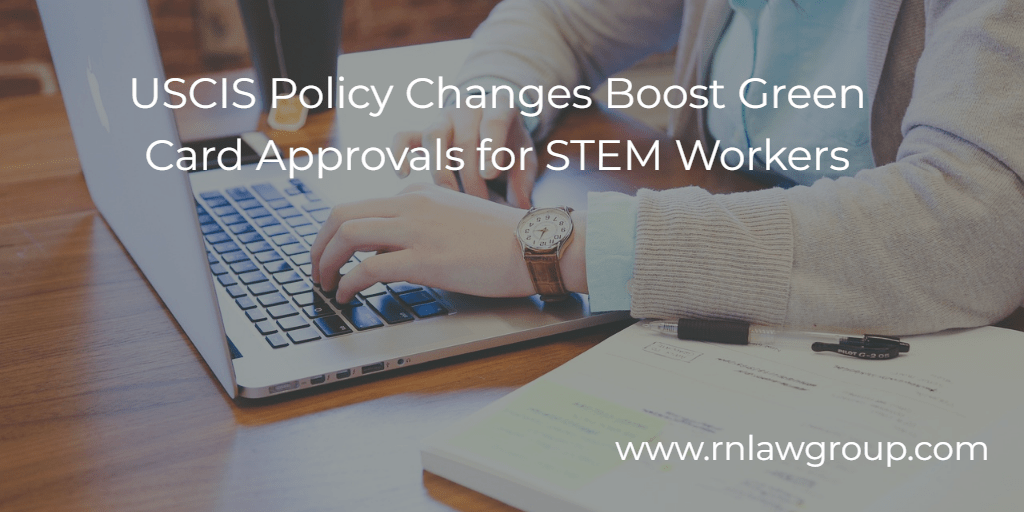
USCIS Policy Changes Boost Green Card Approvals for STEM Workers
An upward trend in green card approvals is revealed in recent data from the U.S. Citizenship and Immigration Services (USCIS), which is noteworthy for foreign-born professionals in STEM disciplines (science, technology, engineering, and math). The increase is in response to USCIS’s modifications to the guideline requirements for a subset of the EB-2 visa, a visa category that is open to STEM workers. Since their implementation in January 2022, these modifications have significantly improved the immigration process for people like software developers, who are born in India.
According to USCIS statistics, the number of O-1A visas given increased by about 30% in the first year of the updated advice to 4570, and this number continued to rise in the following fiscal year, 2023. Similar to this, after a “national interest” waiver was granted, the number of STEM EB-2 visas authorized in 2022 increased by 55% to 70,240 and remained at that level the following year.
These policy changes are in line with President Joe Biden’s continuous attempts to make it easier for foreign-born STEM workers to remain in the United States, even while obstacles like annual green card quotas and country-specific restrictions still exist.
The 2022 guidance clarifies the foreign-born scientist visa application procedure, even though it leaves the total caps on employment-based green cards same. The O-1A work visa is a crucial component that helps high-tech entrepreneurs get a green card more quickly. The guidance updated the requirements for O-1A visas, outlining eight indicators (awards and peer-reviewed publications, for example) that candidates must achieve in order to be considered. Notably, the quantity of O-1A visas granted is uncapped.
The national interest waiver for an EB-2, particularly for individuals with advanced STEM degrees, is the second significant shift. The guidelines simplify the application procedure for scientists conducting extraordinary work of great quality and national significance by outlining requirements that are substantially aligned with those for the O-1A visa and allowing scientists to sponsor themselves.
The National Interest Waiver (NIW) field is one in which the U.S. Citizenship and Immigration Services (USCIS) has published directions in 2022 that outline special considerations for STEM (Science, Technology, Engineering, and Mathematics) applications. This advice emphasizes the value of advances in STEM fields and the vital role that people with advanced STEM degrees play, particularly in subjects that are thought to be vital to the national security or competitiveness of the United States. The 2022 regulations would have offered a more convenient avenue for immigrants to proceed through the O-1A visa process, eventually switching to an EB-1 visa and obtaining permanent residency.
Identification of Emerging and Critical Technology sectors: One of the main points made in the directives is the identification of emerging and critical technology sectors. Authorities such as government-issued lists released by organizations like the Executive Office of the President, National Science and Technology Council, or National Security Council are relied upon by USCIS officers. These lists function as standards for judging the applicability and significance of particular STEM fields. Officers create a thorough examination process by considering the evidence that petitioners present.
Determining the Critical Domains:
First Prong: National Significance and Substantial Merit:
The guidelines place a strong emphasis on the necessity of providing proof that a planned STEM project has both significant merit and national significance. Though U.S. educational interests recognize the value of activities such as STEM classroom instruction, these may not always establish national prominence unless they have wider consequences for STEM education overall. This nuanced methodology guarantees a thorough evaluation of a given endeavor’s possible national impact.
Second Prong: Knowledge and Expertise Taking into account:
The petitioner’s training and skill set are the subject of the second prong of the directions. Advanced degrees are emphasized as advantageous qualifications, especially a Ph.D. in a STEM discipline relevant to the proposed project. USCIS recognizes that people with advanced STEM degrees have specific knowledge in specific STEM fields, which they often acquired from master’s or doctorate theses. Officers assess how well this particular STEM field fits into and advances the suggested project. This evaluation guarantees that the petitioner’s training and experience are closely related to the interests of the country.
Third-Party Assessment: Equilibrium Waiver Conditions:
Petitioners are responsible for proving, in order to evaluate the third prong, that the reasons in favor of the NIW are greater than those that justify requiring a labor certification and job offer. Strong positive evaluations are the result of a number of characteristics, such as having an advanced STEM degree, working in crucial and emerging technology or other important STEM fields, and being in a position to further the proposed STEM venture. This methodical approach guarantees a rigorous consideration of the advantages of granting the waiver in relation to the standard standards.
Benefit to the United States: Examining the advantages that the petitioner’s admission will bring the United States is a crucial component of the instructions. This evaluation takes into account issues like national security and economic competitiveness in addition to the availability of other American workers. Possession of an advanced STEM degree, participation in critical STEM work, and a convincing case that the proposed project has the potential to greatly improve economic competitiveness or national security in the United States are some of the factors that contribute to a strong positive evaluation.
Support from Government Agencies: The acknowledgment of support from concerned US government agencies is another important component. The directives make clear that a petitioner’s case might be greatly strengthened by letters from these authorities. This backing strengthens the argument for the proposed STEM endeavor’s possible influence on national interests. It highlights the project’s larger national consequences and is evidence of the petitioner’s cooperative approach with pertinent government agencies.
In conclusion, a thorough framework for assessing NIW cases in STEM subjects is provided by the USCIS guidelines published in 2022. These guidelines are intended to guarantee a comprehensive and careful evaluation of petitions by highlighting the significance of particular evidential issues, education, and the possible national impact of proposed undertakings. These directions provide as a roadmap for anyone applying for immigration benefits under the National Interest Waiver program, since STEM professions remain vital to American innovation, competitiveness, and security. There is no denying the beneficial effects on high-tech innovation and entrepreneurship, which may have future ramifications for more comprehensive immigration reform.
By: Karim Jivani
Karim Jivani is an Associate Attorney at Reddy Neumann Brown PC who focuses on employment-based non-immigrant visas. Karim’s practice covers all phases of the EB-1A and EB-2 NIW visa process including filing petitions, responding to Requests for Evidence (RFE), and drafting motions and appeals. Karim has also worked on all aspects of H-1B, L-1, I-140, and VAWA petitions.

